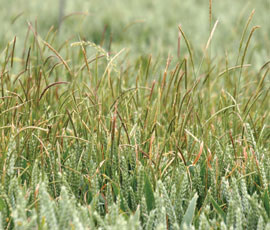Resistant blackgrass on the rise

Rising herbicide resistance played a key role in last year’s unprecedented levels of blackgrass, according to the latest study of populations across the UK.
Speaking at the British Crop Production Council’s annual weed review, Richard Hull of Rothamsted Research pointed out that although the “horrendous” season just passed could be attributed to many factors; rising ALS inhibitor resistance had played its part.
“The dry autumn reduced the efficacy of herbicide applications and the wet spring and summer meant blackgrass tillered vigorously and produced many more heads, resulting in around three and a half times the seed return of 2011,” said Mr Hull.
“However, the results from our latest study have shown that from the sampling taken from 19 random fields across the blackgrass affected areas in 2009-11, 47% showed resistance to Atlantis (iodosulfuron + mesosulfuron).”
In some of the samples used in the glasshouse pot assays, only 50% control could be achieved with the mainstay of most blackgrass herbicide programmes.
“You have to ask whether the use of Atlantis is sustainable in these situations. The mean loss of efficacy between 2002 and 2009-11 was 21%, so it is a worrying trend as post-emergence options are limited,” said Mr Hull.
Other high-risk actives, cycloxydim and clodinafop also showed marked decreases in efficacy during the experiment at 15% and 26%, respectively. However, Mr Hull noted that there was little reduction in the efficacy of residuals such as pendimethalin and chlorotoluron (6-8%).
“As the chemical battle against blackgrass resumes I urge growers to conduct their own in-field comparison trials to ensure they are using the correct herbicide strategy for their soil conditions and blackgrass populations,” he said.
“Stacking residuals at pre- and peri-emergence is the best way to ease pressure on post-emergence treatments, and weighing up the options with some simple side-by-side comparisons on adjacent tramlines is the easiest way.
“This should also apply to post-emergence applications, where there are options other than Atlantis so it’s important to know which one works for you,” he warned.
Mr Hull also reminded growers of the other basic principles in the blackgrass battle. “Get populations tested, consider changes in rotation, cultivations and varietal choices. Drilling date is important, but it is not black and white, as conditions will often dictate the degree of improvement in control,” he concluded.
Read our Herbicide Special

